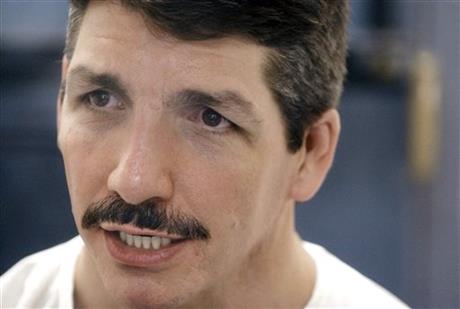
By BRUCE SCHREINER
FILE – This April 2003 file photo shows convicted murderer Paul Dennis Reid during an interview in Nashville, Tenn. Reid who was sentenced to death after he was convicted of killing seven people in a series of 1997 fast-food robberies in Tennessee has died at a Nashville hospital, Friday, Nov. 1, 2013. (AP Photo/Mark Humphrey, File)
A drifter who wound up on death row, convicted of killing seven people in a series of Tennessee fast-food robberies two decades ago, died Friday at a hospital.
Paul Dennis Reid, 55, was pronounced dead at Nashville General Hospital at Meharry, the state Department of Corrections said.
Department spokeswoman Dorinda Carter said the cause of death would be determined by the state medical examiner’s office.
Reid had been in the hospital for about two weeks, Carter said.
Reid was sentenced to death for the 1997 slayings of seven people, including three teenagers, at fast-food restaurants in Nashville and Clarksville.
“Glad he’s dead,” said Doyle Brown, whose 17-year-old daughter, Andrea, was among three people killed at a McDonald’s in the Nashville area.
“I wished it had happened through the justice system several years ago, rather than him just getting sick and dying. But he’s done, and I’m good with that.”
Reid, a former Texas drifter, came to Nashville in hopes of becoming a country singer.
He was fired from his job as a dishwasher at a Nashville Shoney’s in February 1997 for losing his temper and throwing a plate at another worker.
The next day, Sarah Jackson, 16, and Steve Hampton, 25, were slain execution-style at a Captain D’s restaurant not far from the Shoney’s.
One month later, Ronald Santiago, 27; Robert A. Sewell Jr., 23; and Andrea Brown were shot and killed in a midnight robbery at a McDonald’s a few miles from the Captain D’s.
A month after the second set of killings, Angela Holmes, 21, and Michelle Mace, 16, were kidnapped during a robbery at a Baskin-Robbins ice cream store in Clarksville, about 50 miles northwest of Nashville near the Kentucky border. Their throats were cut and their bodies dumped at Dunbar Cave State Natural Area.
“The guy who did it, he’s gone and he’s not going to hurt anybody else,” said Jerry Jackson, the father of Sarah Jackson. “This is closure for us.”
Jackson said he wanted to hear Reid admit to the slayings but never got the chance.
Jackson said his daughter was “a real special person.” The outgoing honor student with the beautiful smile aspired to become a journalist, her father said.
“There’s no telling what she could be now,” he said Friday night.
Doyle Brown said his daughter had saved enough money from her part time job at McDonald’s to buy a used car.
“We actually picked it up the day before she was killed,” he said. “She was a great student, a great daughter, had a great life ahead of her that she never got to experience. An innocent victim.”
Reid was arrested in June 1997 and linked to the murders after police say he attempted to kidnap and kill the Shoney’s manager who fired him.
The Tennessee Supreme Court ruled earlier this year that family and legal advocates for Reid could not continue to appeal his convictions against his wishes.
The opinion noted that Reid was undeniably brain-damaged, but his advocates had failed to prove that he was mentally incompetent to decide to abandon his appeals.
Reid had said he was under government surveillance and believed his trials were mock trials and his attorneys were actors playing a role. But he also told psychiatrists that his delusions were a hoax he had used to avoid prosecution in the past, according to the court’s opinion.
Reid had said he wanted to abandon his appeals and accept the death sentence, but his sister and his post-conviction attorneys said he lacked the mental competency to make those decisions and they wanted to continue his appeals on his behalf.
Courts in Nashville and Clarksville conducted hearings on his competency in 2008. Both concluded his advocates failed to prove his mental incompetency based in part on conflicting expert opinions about his delusions.



